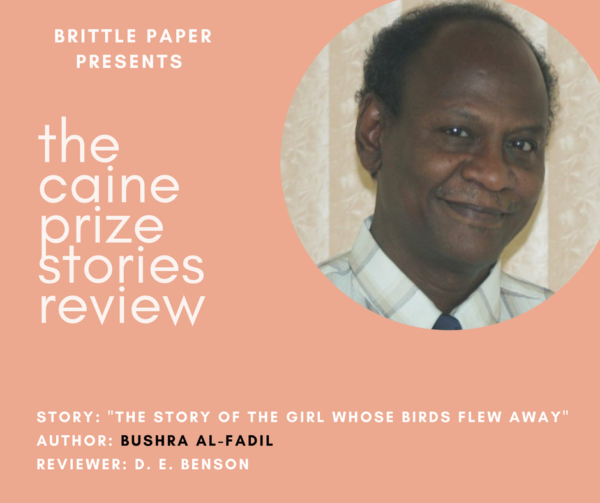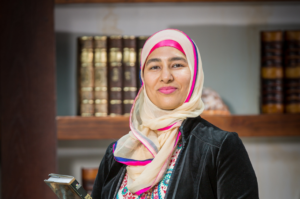 It is an annual Brittle Paper tradition to review the five stories shortlisted for the Caine Prize. Through this, we hope to open up conversations around the stories, to find out what is interesting or innovative about them. Following the announcement of the 2017 shortlist, we published our first and second reviews. We bring you our third #CainePrize2017 story review: Bushra al-Fadil’s “The Story of the Girl whose Birds Flew Away.”
It is an annual Brittle Paper tradition to review the five stories shortlisted for the Caine Prize. Through this, we hope to open up conversations around the stories, to find out what is interesting or innovative about them. Following the announcement of the 2017 shortlist, we published our first and second reviews. We bring you our third #CainePrize2017 story review: Bushra al-Fadil’s “The Story of the Girl whose Birds Flew Away.”
Bushra al-Fadil is a Sudanese poet and fiction writer, with a PhD in Russian Language. In the early 1990s, he was expelled from his lecturing position at Khartoum University due to his political activism. He currently lives in Saudi Arabia. At 65 years of age, he is the oldest ever to be shortlisted for the Caine Prize. Translated by Max Shmookler, “The Story of the Girl whose Birds Flew Away” is the second ever nominated to have been written originally in Arabic. It is the title story of his short story collection, with the translation published in the anthology The Book of Khartoum – A City in Short Fiction. He has published four collections of short stories in Arabic, including Above a City’s Sky. He won the 2012 Altayeb Salih Short Story Award.
“The Story of the Girl whose Birds Flew Away” is reviewed by D.E. Benson.
*
Caine Prize 2017 Story Review: Bushra al-Fadil’s “The Story of the Girl Whose Birds Flew Away”
Perhaps the first thing to do before reading Max Shmookler’s translation of Bushra al-Fadil’s chaotic and evocative “The Story of the Girl Whose Birds Flew Away” is to forget it is just that—a translation. The second thing is to not approach it with a preconceived notion-to-understand. The expected, demanded absence of this notion is why al-Fadil’s narrative is how it is—and it is what mars it.
Seen through the dislocated narration of an unnamed, unemployed city-dweller too keen and curious for his own sanity, one is lured by the nostalgia and immediacy in its opening sentence: “There I was, cutting through a strange market crowd….” Which sets the tone for a story that is, in truth, about cutting through strange things, through strange people, and through strange (and not so strange) incidents and interactions. A story that is about cutting through the aesthetic chaos of existence.
With its urgent and unsystematic sentences, al-Fadil’s tale does not seek to make sense of this chaos; rather, by placing itself in its centre, it revels in it. With the narrator, we “cut, sharp-toothed, carving a path through the crowd”; with him, we see the sights, the “voices and heard boundless scents”: “sellers roaming and street kids groaning, god-damners, bus-waiters and white-robed traders, elegant and fumbling”; we observe “a slap to another’s cheek,” “a passerby clutched his shoulder in pain,” “a boy weaving an empty tin can along the ground with his feet,” “a blind man looking out before him as if he were reading from that divine book which preceded all books.”
To approach the narration without a preconception is to feel this narrator’s hunger, to think his thoughts with him. Without being infected by his madness, the story becomes simply obscure and pointless, like a poem we have been told is particularly good but we do not quite see or know why. So then the city’s rowdiness is a premise upon which the narrator’s hunger is built, until this clarity: “and then, suddenly, in the midst of all of that, I saw her.”
From nowhere, The Girl Whose Birds Flew Away shows up, stepping into the chaos, “soaring without swaying” and with the “swagger of a soldier.” Our hearts could skip a beat on encountering her, and after the story ends, there is a mild, nagging feeling that we did not get half as much as we wanted. But there is really no point in wondering why she is The Girl Whose Birds Flew Away, or why she is “the true heart of the people”; we just know: because al-Fadil’s story is a dream sequence. The stark poetry of the narrator’s delirious description of this enchanting and mysterious feminine symbol is the only other thing that challenges for attention at this point:
Her nose was like a fresh vegetable and by God, what eyes! A pharaonic neck with two taut slender chords, only visible when she turned her head. And when she turned her head, I thought all the women selling their mashed beans and salted sunflower seeds would flee, the whole street would pick up and leave only ruts where they had been, the fetid stench of blood would abandon the places where meat was sold. . . . And if you poured water over the crown of her head, it would flow down past her forehead. She walked in waves, as if her body were an auger spiralling through a cord of wood.
This vision of beauty, with all her aura of heavy symbolism, of a promise of gaiety and laughter, brings along a talisman—a younger version of herself. For what it is worth, this is a metaphor of a future that is assured. That the normally boisterous crowd makes way for them at the bus stop may be a mocking foreshadow of the freak jostling that attends their end.
The exchange between the enamoured narrator and The Girl Whose Birds Flew Away is done in a language that the reader is almost not invited into; it is an exchange between initiates.
‘Made of red blood, are you? And was your heart a single rose struck by tragedy after tragedy until it folded back upon itself?’
She laughed again and my heart felt the soothing snow of contentment and joy.
‘A poet?’ she asked.
‘So they say,’ I said, adding: ‘Who told you?’
‘We’ve heard,’ she said.
At its best the dialogue rocks gently back and forth, tidal and smooth. What Bushra al-Fadil offers is best appreciated as art for its own sake. To try tormenting meaning out of it will most likely make it lose its coveted haunting feel.
It isn’t a surprise that this narrator, who happens to be a poet, is all too familiar with isolation, whether self-imposed as when he resorts to escapist daydreaming in the bus, or community-imposed as when he is considered mad for thinking differently of what happened to The Girl Whose Birds Flew Away and her talisman. The gathering of the crowd is the final rite in his excommunication. By taking to the tarmac, terribly disappointed, he embarks on a journey into self, finding consolation in the hope that there is rest in the eyes of “the lovers at the river.”
This could be symbolic of the exilic experience of generations of Sudanese poets. Mahammad al-Wathig’s Sudanese Poetry in the 20th Century is strewn with such narratives. There was Al-Tijan, a leading Sudanese poet in the first half of that century, who was love-stricken by the city of Khartoum and later isolated by the city’s elite, forcing him to withdraw into himself and to seek solace in his memories of a foreign land. There were also the poets of the 1930s and 1940s: Idris Jamma’, Abdulnabi Mursal and Mohammad Mohammad Ali who all suffered withdrawal and, in the case of al-Tijan, mental imbalance induced by their dismay at the social and economic violence perpetuated in their time. Perhaps al-Fadil, writing from a place of exile himself—he currently lives in Saudi Arabia, having being expelled from his lecturing position at Khartoum University in the 1990s due to his political activism—has preserved in a timeless piece a metaphor for the fate of the conscientious writer in the African socio-political space.
But this story does not in the least need to be validated by a historical context. It is as poetic as it is riveting, as entertaining as it is disturbing, and this is enough. Its poetic appeal does not reside only in the vivid and earthy imagery but as well in the mildly disjointed sequence. It is impressive how Shmookler’s translation maintains a delicate musicality with alliteration. Part of the first sentence reads: “beggars and butchers and thieves, prancers and Prophet-praisers and soft-sided soldiers, the newly-arrived and the just-retired….”
Bushra al-Fadil’s story is an important mosaic. It is a bridge: it exposes the reader-in-English to the treasures of the indigenous Sudanese literary sphere.
*
Read Bushra al-Fadil’s “The Story of the Girl whose Birds Flew Away.”
***************
About the Author:
 D. E. Benson is a Nigerian poet. He is currently studying literature as an undergraduate.
D. E. Benson is a Nigerian poet. He is currently studying literature as an undergraduate.









Chiamaka June 08, 2017 06:55
I see 'the girl whose bird flew away' as hope in dismay... and really,damn the hope.